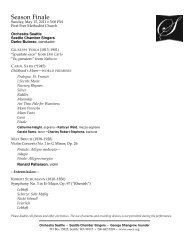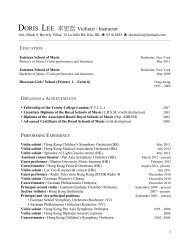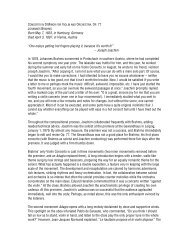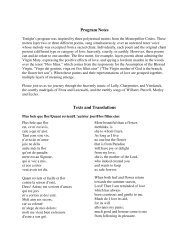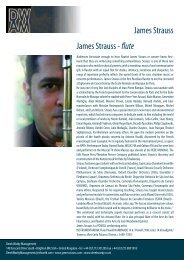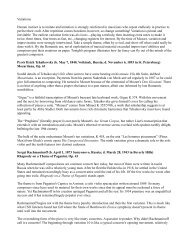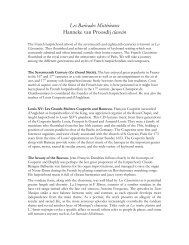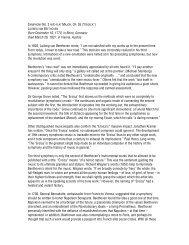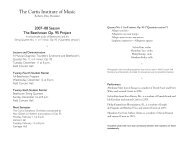download - InstantEncore
download - InstantEncore
download - InstantEncore
Create successful ePaper yourself
Turn your PDF publications into a flip-book with our unique Google optimized e-Paper software.
10-13 Mahler:Layout 1 10/3/11 11:38 AM Page 31<br />
they are not much associated with Mozart. In<br />
this opening, Mozart seems to be looking<br />
ahead to the perplexing chromatic ruminations<br />
of Don Giovanni, which, as it happens,<br />
Prague would giddily idolize within a year.<br />
By the time Mozart turned 21, in January<br />
1777, he had already experienced more of<br />
the world than most young adults of any era<br />
would approach in a lifetime. As a child<br />
prodigy, he had impressed musical connoisseurs<br />
and had entertained crowned heads in<br />
At the Time<br />
many European capitals. When he reached<br />
his majority, Mozart’s compositions at least<br />
equaled and often surpassed the best work<br />
of his contemporaries, and he had begun to<br />
make a mark in all the major genres. However,<br />
the young composer felt repressed in<br />
what he viewed as the artistic backwater of<br />
Salzburg, and he yearned to pursue his career<br />
elsewhere.<br />
In September 1777 Mozart and his mother<br />
embarked on a journey north and west, tracing<br />
a route from their home in Salzburg to<br />
In the years 1786–87, when Mozart composed and premiered his Symphony No. 38, the following events were<br />
taking place:<br />
1786: Jacques Balmat and Dr. Michel-Gabriel Paccard become the first<br />
men to climb France’s Mont Blanc; Robert Burns (top right) publishes<br />
Poems, Chiefly in the Scottish Dialect, his first book of poetry; Charles<br />
Cornwallis, whose surrender to American forces at Yorktown signaled<br />
the end of major fighting in the American Revolution, is appointed governor-general<br />
of India; George Washington calls for the abolition of slavery;<br />
the Necklace Affair (“L’Affiare du Collier”) trial ends in Paris; Reykjavík,<br />
the capital of Iceland, is founded; Johann Wolfgang von Goethe embarks<br />
on his travels to Italy; Daniel Shays, a Revolutionary War veteran, leads a<br />
rebellion that begins in Springfield, Massachusetts, to protest evictions<br />
and seizure of property for non-payment of debts<br />
1787: William Herschel discovers Titania and Oberon, moons of<br />
Uranus; Milan’s Teatro alla Scala is built by Giuseppe Piermarini<br />
(center); the Constitutional Convention convenes in Philadelphia<br />
(bottom); Morocco becomes the first country to recognize<br />
the United States as a sovereign nation; the Ottoman Empire<br />
declares war on Russia; Irish painter Robert Barker invents and<br />
patents the panorama; the first left and right shoes are made;<br />
Alexander Hamilton becomes the first U.S. Treasury secretary;<br />
the Constitution of the United States is completed and signed,<br />
going into effect on March 4; the first ships carrying convicts<br />
leave Great Britain for Australia’s Botany Bay<br />
(penal transports will continue until 1853)<br />
— The Editors<br />
October 2011 31




